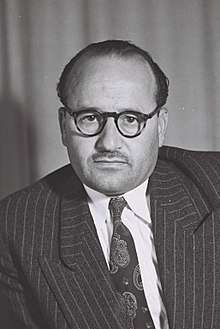Seif el-Din el-Zoubi
Seif el-Din el-Zoubi[note 1] (1913 – 26 June 1986) was an Israeli-Arab politician.
| Seif el-Din el-Zoubi | |
|---|---|
 | |
| Date of birth | 1913 |
| Place of birth | Nazareth, Ottoman Empire |
| Date of death | June 26, 1986 (aged 72–73) |
| Knessets | 1, 2, 3, 6, 7, 8, 9 |
| Faction represented in Knesset | |
| 1949–1951 | Democratic List of Nazareth |
| 1951–1959 | Democratic List for Israeli Arabs |
| 1965–1966 | Progress and Development |
| 1966–1967 | Cooperation and Development |
| 1967–1974 | Progress and Development |
| 1974–1976 | Alignment |
| 1976–1977 | Progress and Development |
| 1977–1979 | United Arab List |
Biography
El-Zoubi was born in 1913 in Nazareth, where he attended high school. During the British Mandate of Palestine, he was active in the Haganah, and later received the Fighter of the State Decoration. From 1959 to 1974 he was the mayor of Nazareth.
In 1949 he was elected to the Knesset as the leader of the Democratic List of Nazareth. He was re-elected in 1951 on the Democratic List for Israeli Arabs, and 1955, but resigned from the Knesset on 13 February 1956. In 1959 he became mayor of Nazareth, holding the post until 1965, when he returned to the Knesset on the Progress and Development list, which briefly merged into Cooperation and Development before regaining its independence. He was re-elected in 1969 elections, and in 1971 became mayor of Nazareth again, holding the post until 1974. After re-election in 1973, el-Zoubi was appointed Deputy Speaker of the Knesset. In 1974 Progress and Development merged into the Alignment, before leaving it and forming the United Arab List. He was re-elected for a final time on the United Arab List slate in 1977, before resigning his seat on 3 April 1979. He died in 1986.
Haneen Zoabi, the Joint List MK, is a relative.
Controversy
According to Israeli historian Ori Stendel, el-Zoubi had used his ties with the Israeli establishment to compensate for the decline of his political power within the Zubia clan.[1] Historian Hillel Cohen wrote that elZoubi was "upgraded" by Mapai in exchange for relinquishing national demands and legitimizing land confiscations.[2] Yitzhak Laor described his conduct as tantamount to taking political bribery.[3]
Publications
- Autobiography: ”Eyewitness” (Arabic: شاهد عيان, 1987)
References
- Stendel, Ori (1996). The Arabs in Israel. Sussex Academic Press. pp. 85. ISBN 1-898723-23-0.
- Cohen, Hillel. "Good Arabs (excerpt)". Text 2006 (in Hebrew). Retrieved 2008-06-07.
- Laor, Yitzhak (2007-02-15). "Under the steamroller". Haaretz. Retrieved 2008-06-08.
Notes
- Arabic: سيف الدين الزعبي, Hebrew: סַיִף אֵל־דִּין אֶל־זעֻבִּי; in Hebrew his name was most often written without niqqud (as is standard) as סיף א־דין א־זועבי.
External links
- Seif el-Din el-Zoubi on the Knesset website